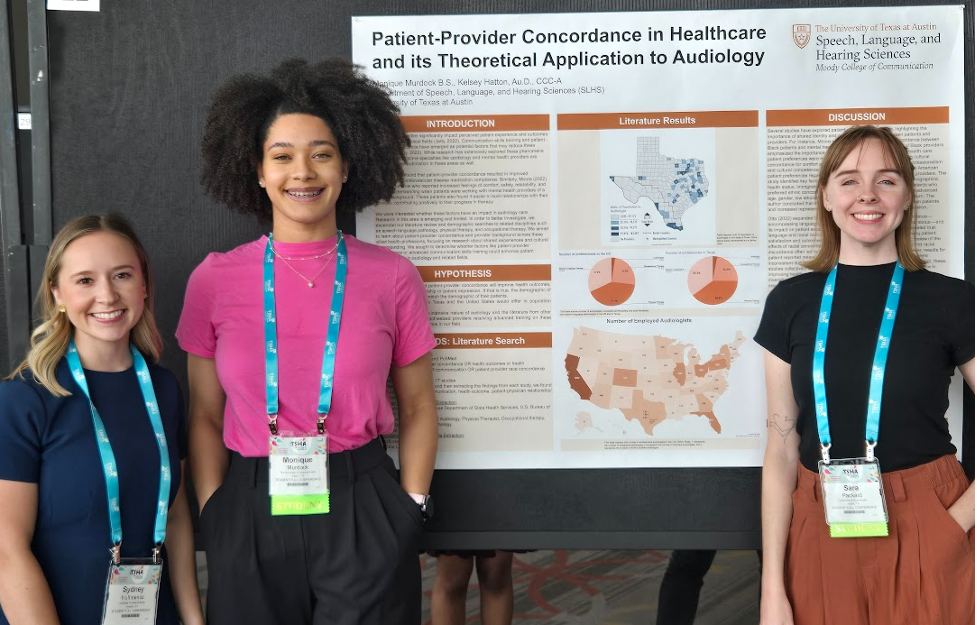.png?ver=uhd0d4wgm3mzcgPMnMT03g%3d%3d)
By: Kelsey Hatton, AuD, CCC-A, Vice President of Audiology
Hello, Communicologist Readers!
As a new Vice President for Audiology in 2025, I wanted to say “hello” to y’all this summer as well as use this space to showcase a wonderful audiology activity. Those who attended the Texas Speech-Language-Hearing Association (TSHA) 2025 Convention in San Antonio got to network with colleagues, be updated on best practices, and hear about new research in our fields. Our student members benefit from those activities, but they are especially important research contributors within audiology due to the requirement of completing dissertation or capstone projects at the graduate level. Even undergraduate students considering speech-language or hearing science degrees are often encouraged to participate in laboratory research to help them gauge their interest in applying for further training in our fields. Knowing this, TSHA Audiology designed a session at Convention to highlight student research efforts, and I look forward to it every year.
The Audiology Student Research Symposium at the TSHA Convention was first held in 2021, and it has become an opportunity for PhD, AuD, and undergraduate students to present their research projects. We recruit from our pool of awesome audiology clinicians and instructors as judges to determine the top entries each year. They award prizes ranging from $100 to $300 to recognize outstanding student work. It’s a great way to platform the ideas and interests of students and let them develop a taste for presenting (and ideally inspire them to present again in the future!).
The first symposium was virtual and well received by attendees. The positive reviews encouraged the educational planning committee to continue the activity in-person for subsequent conventions. Our initial format allowed students to submit their work as a 20-minute podium presentation with five minutes of panel and audience questions. This allowed an in-depth look at a few projects, attracting excellent submissions from PhD candidates. To expand the discussion and encourage additional submissions for our more clinically focused audience members, we have updated the variety of submission types. In addition to PhD projects, we now welcome group research lab projects, capstone projects, and presentations about unique clinical cases in the format of a poster session. These changes have attracted more submissions on a wider variety of topics. We also want to applaud the fact that posters are now being submitted from more different training programs within Texas. We even had some motivated undergraduate TSHA members submit a poster and earn an award at the 2025 Convention.
This past year, TSHA Audiology awarded $650 in prizes for our top three Symposium entries. We celebrated with the students and continued discussing their projects during our Audiology Social immediately following the Symposium, a tradition we plan on continuing when we meet in Fort Worth next year. The Audiology Programming Committee is proud to share a summary of the 2025 posters below and give our readers insight into the kinds of projects our student members with audiology projects can submit.
I hope that you’ve enjoyed reading about a piece of what we do in the audiology corner of the association. Maybe this article will inspire you, and it also serves as my personal invitation to all members to join us for the fifth edition of the Audiology Student Research Symposium at the TSHA 2026 Convention!
TSHA 2025 Convention Audiology Student Research Symposium Participants
- Sydney Huthnance presented “Retrospective Analysis of Characteristics and Outcomes of Children with Auditory Neuropathy Spectrum Disorder (ANSD),” advised by Dr. Michelle Hsieh. Her poster included a discussion on congenital hearing loss, which diagnostic audiologic tests are commonly used when identifying children with auditory neuropathy, and the heterogenous clinical results for these children from 12 years of data. She won first prize in the Symposium as well as a prize in the overall 2025 Convention poster session.
- Monique Murdock presented “Patient-Provider Identity Concordance in Healthcare and its Theoretical Application to Audiology,” advised by Dr. Kelsey Hatton. She reviewed literature on patient outcomes when families feel their provider has a shared background or concordant experiences and how clinicians from different backgrounds from their patients can undergo training to enhance communication, patient trust, and family compliance with clinical recommendations. She won second prize in the Symposium.
- Laura Martinez, Aaliyah Ibarra, Valeria Mendez, Triana Gonzalez, and Kayla Sifuentes presented “Investigating Classroom Acoustics and Perceptions for Improved Hispanic Educational Outcomes,” advised by Dr. Sumalai Maroonroge. The group took measures of classrooms on their campus and surveyed college students about their learning environments, finding students preferred learning in spaces that most closely met ANS/WHO classroom background noise guidelines. They won third prize in the Symposium.
- Sara Packard presented “Test Measures in Pediatric Auditory Neuropathy Spectrum Disorder: A Retrospective Analysis,” advised by Dr. Michelle Hsieh. Her poster included a discussion on which components of the diagnostic audiologic test battery used to identify children with auditory neuropathy are the most valuable, using information from a multi-center collaborative database.
- Kenzie Mills, BaileyAnn Toliver, and Caroline Vaughn presented “Eye Gaze Patterns and Comprehension in Adults with and without Hearing Loss,” advised by Dr. Candace Hicks. She tracked the eye movements of subjects with and without hearing loss to determine if background noise impacted where and how long they looked at a person’s facial cues when trying to understand them.
- Ged Pearson presented “An Analysis of Auditory Processing Diagnostic Results in Individuals with a History of Musical Training,” advised by Dr. Sangeeta Kamdar. He tested musicians and non-musicians with an auditory processing disorder diagnostic test battery to determine whether musical training provided improved auditory processing abilities to determine if musical training could help those with APD.
Pictured below, from left to right, are Syndey Huthnance, Monique Murdock, and Sara Packard in front of Monique’s poster.

More Executive Board News
• Volunteer for TSHA Today!
• Executive Board Roster
• View the Current TSHA Strategic Plan